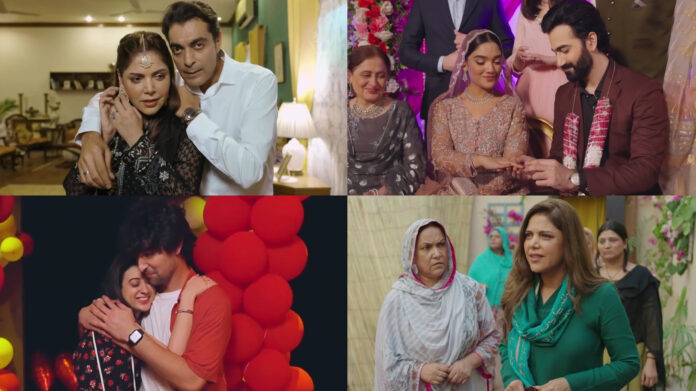The opening plot of Geo TVs recently aired, Hadsa gives us a chance to thoroughly examine an angle of society that is often ignored i.e., a repressed mindset.
Giving the viewers insight into the title, the very first episode began with a road accident – a reflection of what’s to come so brace yourself for serious tragedies that will be coming your way throughout this plot.
Plot and Story for Hadsa
The plot brilliantly describes an array of sensitive topics such as domestic violence, victim-blaming, patriarchy, misogyny and feudalism, along with a commentary on surging street crimes – a lot to handle right?
Lauded by the viewers for playing ‘Khadija Fatima’ in the much-hyped Pinjra last year, Hadiqa Kiani this time appears in the lead as an independent, Oxford graduate and a patriotic woman — ‘Taskeen Malik’.
Being a mother of three (two sons and a daughter), Taskeen handles her household and office duties very gracefully. There aren’t many female characters in our dramas like Taskeen who manage financial and household matters in a compelling and commanding way.
The second episode, however, reveals multiple layers of Taskeen’s character as the engagement ceremony of her son Kumail (played by Khaqan Shanawaz) and daughter Bakhtain (played by Romaisa Khan) kicks off.
Taskeen’s husband Ghazanfar (played by Ali Khan) is portrayed as a strong and open minded individual who not only loves but also empowers his wife treating her as an equal and not as a subordinate, and also stands by her side through thick and thin.
Not to mention, Malik as a loving husband makes way for Taskeen to shine as much as she wants – but how long will he stand by her?
The relationship between the duo portrays an ideal marriage life till now, where the wife holds her own ground to make decisions and stand by her values. While no book (or husband) can be judged by its cover, Ghanzanfar is proving himself an inspiring husband so far, atta boy!!
Hadsa finally gives us what we’ve all been waiting for – A strong female protagonist!
Hadiqa has adorned her character with such grace and charm. There are few scenes in both of the episodes where we can say that our girl has definitely succeeded in ruling the screens and our heart as well.
Wait, there’s more! – It’s not all sunshine and rainbow in Taskeen’s world
Her relationship with her only son-in-law Waleed — a misogynist feudal lord, takes a rough turn when she refuses to send her maid’s daughter Nazma back to her home after being subjected to physical abuse by her husband Fika (a servant of Waleed).
Waleed asks Taskeen to send back the maid, keeping in mind that Taskeen wouldn’t say no to him as he holds the status of an ‘only damad’. This in essence reflects persisting and prevalent draconian cultural and social norms of a desi household where apparently sons-in-law, fueled by misogyny and patriarchy and misplaced sense of entitlement, enjoy a freehand to demand whatever they want and do whatever they want.
By turning down Waleed’s demand, Taskeen not only breaks a significant taboo by refusing to comply, but also essentially shatter the latter’s ego when she says, ‘Main kisi qeemat par usay us darinaday ke pas nahi bhejungi chahe kuch bhi hojaye’ – ‘At no cost I will send her back to that monster [of a man]’
This was followed by another viewer-favorite iconic line, ‘Apna beta hota to jawab or bhi sakht hota’ – ‘[my] response would’ve been much stringent If it was my son’ – a line that has made way into viewers’ hearts.
Spotlight on Domestic Violence
Furthermore, Hadsa accentuates another prevalent socio-cultural filth – the issue of domestic violence, with Taskeen Malik taking a stand for the victim. This scene depicts how this crime has been embedded into our society as is unfortunately treated as a ‘norm’ to an extent that the mere act of speaking about it is in fact considered ‘brave’.
Things take a drastic turn when she witnesses her maid being physically assaulted by her husband. Taskeen tries to control herself but eventually caves in. Filled with disgust she couldn’t stop herself from hitting the husband as a result. The impact of this scene is further strengthened by Hadiqa Kiani’s intense and real-life expressions.
Moreover, the third episode has revealed another aspect of Taskeen’s personality when she experiences a nightmare seeing Fika – her maid’s husband, attempting to kill her. This in essence reflects how much Taskeen is actually involved in this whole situation but didn’t step back regardless of anything – it needs a lot of patience and courage to deal with such traumatic experiences even for those who are not victims themselves but who merely raise voice for them.
What’s coming next for Taskeen in the story, indicates that more traumatic situations and circumstances are to come in subsequent episodes.
Hadsa is a daunting reflection of our society and its draconian norms!
Hadsa highlights a number of pressing issues that ail our society. Writer Zanjabeel Asim Shah and Directors Wajahat Rauf and Shazia Wajahat never fail to bring something not only unique and bold in its context, but also deliver a flawless execution as well. Additionally, Hadiqa Kiani and Aly Khan’s immaculate performance gives us a surreal life-like experience of what’s its like to be in Taskeen’s shoes.
Tragedies ahead…brace yourselves!
Considering the fact that Taskeen’s family is portrayed as a wealthy, respectable and powerful and one which takes pride in its independence and uprightness. It is yet to be seen that whether Taskeen’s family will support her if she herself is a victim of any heinous domestic abuse such as rape? Or will they fall prey to socio-cultural shackles of so-called ‘honor’ and fail to support Taskeen?




